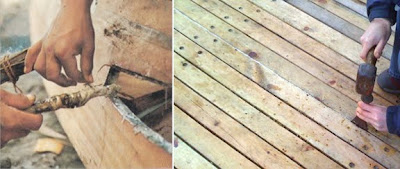“2. Maybe the timbers being used were harder or softer, or stronger or weaker than that available in the Phoenician shipyards”
First of all, whatever wood Nephi was directed to use by the Lord would have been found in the area of present day Salalah in Oman, approximately 2200 miles from Phoenician forests (about 3000 miles by sea).
Secondly, no matter the softness or hardness of the wood, woodworking techniques for shipbuilding followed the same methods in that period—working with the saw to cut the wood, with the adz to shape the wood, and with chisels and bow drills for intricate detail.
Thirdly, Phoenicia was a maritime people living along the northern coast of present-day Lebanon, north of Israel, and were well known in Greece and Rome and throughout the Mediterranean Sea, but traded mostly with the northern lands of the Mediterranean from around 1550 B.C. They did not move further south than Tyre (some claim to Acre and Dor, all north of Meggido and about 100 miles north of Jerusalem), and were well known northward, including Sarepta and Sidon, and northward to Byblos and Tripoli—8 city-states where their shipbuilding would have taken place. They would have been relatively unknown to the south atop the mountains in the Jerusalem area, and by 600 B.C., their power and influence was on the decline, ending around 300 B.C.
By contrast, According to anthropologist Cheryl Ward of Coastal Carolina University, Egyptian seafaring ships had traveled to Byblos to bring back “cedars of Lebanon” as early as the third millennium B.C. They were still sailing the Red Sea around 600 B.C. when Lehi traveled there.
“3. Maybe the Lord had them use a special kind of joining that would make the ship more water-tight”
Another ridiculous “maybe” since all ships from the beginning of time used some type of caulking to make their constructions water tight. Even Noah, in his Ark used pitch to make sure his boat was water-tight (Genesis 6:14).
 As anyone who has any knowledge whatsoever of ship building knows, caulking of planked ships and boats required caulking, whether a pitch or tar type, wax, or a cotton filament driven between the planks, caulking was essential to keep any boat or ship afloat in any water environment, whether stream, river, lake, sea, or deep ocean.
As anyone who has any knowledge whatsoever of ship building knows, caulking of planked ships and boats required caulking, whether a pitch or tar type, wax, or a cotton filament driven between the planks, caulking was essential to keep any boat or ship afloat in any water environment, whether stream, river, lake, sea, or deep ocean. When a major project of rebuilding the 5,000 year old Pharoah’s ship was undertaken with mortise and tenon plank construction, the ship leaked like a sieve until a cotton fabric caulking was hammered between the plank joints. Even the most precise engineered joining of planks, soaked and expanded in water, will leak unless a caulking is used.
When a major project of rebuilding the 5,000 year old Pharoah’s ship was undertaken with mortise and tenon plank construction, the ship leaked like a sieve until a cotton fabric caulking was hammered between the plank joints. Even the most precise engineered joining of planks, soaked and expanded in water, will leak unless a caulking is used. “4. Maybe they needed to work the timbers in place and then bring the finished timbers down to the beach (assuming the timbers were a distance away)”
 The ancient Egyptian ships were built at Koptos along the Nile River, were disassembled and carried by camel 90 miles to Saww along the shores of the Red Sea, where they were then reassembled over a thousand years before Lehi left Jerusalem. Stated differently, more than a thousand years before Nephi built his ship “unlike those of men,” ships were being built along river banks, on sea coasts, and inland to be hauled to the rivers and sea to be reassembled. Such a suggestion by Meldrum strikes at the heart of the ignorance of the individual making such a suggestion.
The ancient Egyptian ships were built at Koptos along the Nile River, were disassembled and carried by camel 90 miles to Saww along the shores of the Red Sea, where they were then reassembled over a thousand years before Lehi left Jerusalem. Stated differently, more than a thousand years before Nephi built his ship “unlike those of men,” ships were being built along river banks, on sea coasts, and inland to be hauled to the rivers and sea to be reassembled. Such a suggestion by Meldrum strikes at the heart of the ignorance of the individual making such a suggestion.“5. Maybe the ribs were made differently from those of the Phoenicians”
As stated earlier, however the Phoenicians constructed their ships simply would not have been known to farmers living inland and atop the mountains at Jerusalem in 600 B.C. However the Lord taught Nephi to construct his ship, it would be highly unlikely that Nephi would know it was different from the manner in which the Phoenicians built their ships over the previous one thousand years.
(See the next post, “When is Reason Called Speculation? Responding to Rod Meldrum’s Answer – Part IV” for responses to more of Meldrum’s “maybes” that fall far short of knowledgeable answers)




No comments:
Post a Comment